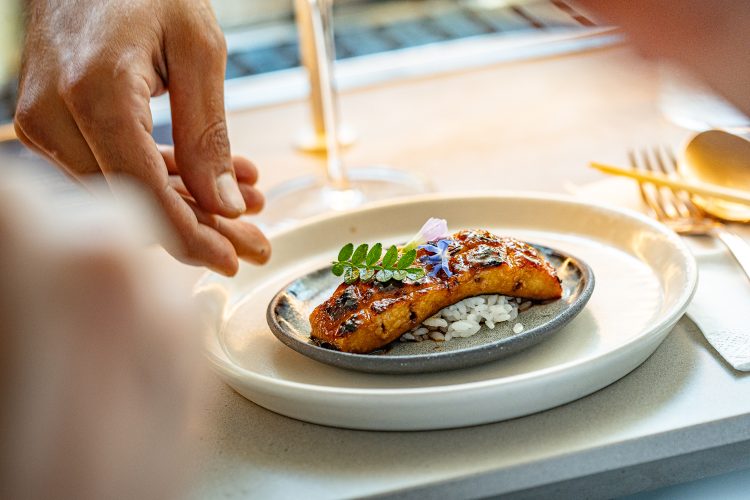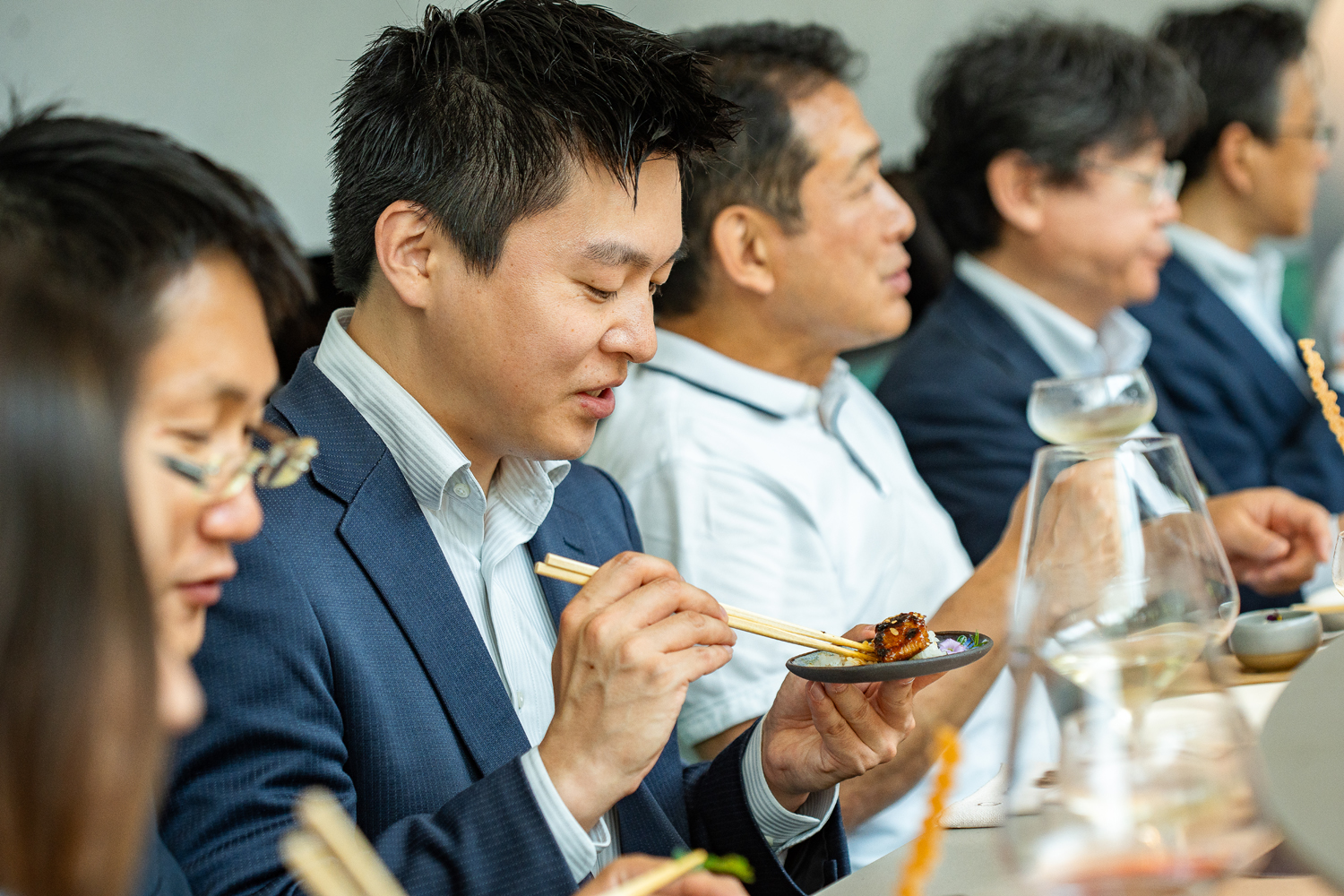A look inside the Forsea seafood experience
Posted: 4 July 2024 | Roee Nir | No comments yet
Here, Roee Nir explains how Forsea’s cultured eel meat offers a sustainable solution to the declining wild eel population, while preserving the culinary tradition of unagi.


Image Credit: Liran Maimon
By Roee Nir, Co-Founder and CEO of Forsea Foods
Cultured seafood meat is needed now more than ever. With its unique organoid technology, Forsea is culturing eel meat in order to help preserve the wild eel population and provide a sustainable solution to consumers who view unagi as an important culinary tradition.
On Monday, June 4th, culinary history was made. It was the first time that esteemed guests gathered together at a fine dining restaurant to taste dishes that centered around lab cultured unagi (eel).
The location was a luxurious Tel Aviv restaurant named “a”. The restaurant’s celebrated chef, Yuval Ben Neriah, paced back and forth with excitement, making sure every little detail was just as it should be. Also on hand were the founders and executive management team of Forsea, a foodtech start-up whose technological breakthrough served as the catalyst for this special event.
Saving an endangered species
Forsea is a company with a mission to save wild eel populations – as well as other endangered aquatic species – by culturing cell and fish tissue via a proprietary organoid technology. Forsea is focusing on Japanese unagi eel (Anguilla Japonica) first and foremost because is approaching extinction due to overfishing and the virtual impossibility of breeding this species both in the wild and under aquafarm conditions.
Unagi is a culinary staple in Japan and a very important component of Japanese food culture. It has been enjoyed as a traditional dish for thousands of years. Unagi is coveted outside of Japan as well, and is considered a delicacy in Europe, the United States and other countries in Asia. The surging demand for unagi, alongside its reduced population, has caused its wholesale price to rise to up to 60 USD per kilo. Unless new solutions are implemented, unagi’s public availability will dwindle and it will eventually vanish from our oceans. This is where Forsea comes in.
A new approach
Forsea’s approach to fish tissue lab cell culturing is radically different than all other meat cultivation practices. Relying on revolutionary research conducted by professor Iftach Nachman, who serves as Forsea’s Scientific Advisor and is one of its Co-Founders, Forsea was able to develop a patented method that allows fish cells to spontaneously assemble into three-dimensional tissue structures, while maintaining their natural composition of fat, muscle and connective tissue. Because this process resembles the natural way living fish tissue grows and develops, there is no need for the scaffolding stage, which traditionally supports the cultured tissue development structure in the lab. There is also less need for the additions of costly growth factors.
The absence of scaffolding and reduced growth factors usage greatly increase the method’s commercial viability and potential for scale, and is aligned with Forsea’s vision to achieve price parity and bring cultured seafood to closer to consumers’ plates. Acutely aware of industry challenges, Forsea expects its approach to make it easier for cultured eel meat to penetrate key markets, eventually changing the eel meat supply landscape.
According to Roee Nir, Forsea’s CEO and Co-Founder, the company’s inaugural unagi product is expected to launch commercially in Japan in 2025, with US and European markets soon to follow. As a nutritious alternative to ocean-fished and aqua-farmed unagi, Forsea’s cultured eel meat will contribute greatly to the conservation of the Japanese eel population. In addition, cultured unagi is developed in a sterile lab environment, nourished with plant-based materials, and is free from hormones, antibiotics and pollutants.
Yet for Forsea’s product to succeed, a groundbreaking process isn’t enough. The product must taste good and resemble real unagi both in terms of flavor and texture. To this end, Forsea has been working closely with chefs in order to achieve culinary excellence. First, the company began a fruitful collaboration with executive chef Katsumi Kusumoto, owner of SAIDO, an esteemed Tokyo vegan restaurant. A second collaboration was brokered with chef Yuval Ben Neriah, who specializes in elite Asian cuisine and is a shining star in Israel’s culinary scene. Chefs such as Kusumoto and Ben Neriah are excited to work with Forsea’s unagi, since they recognize its ability to replicate the rich flavor and melt-in-your mouth texture of the Japanese eel, including its trademark flakes and thin edible bones.


At the event, guests gathered together at a fine dining restaurant to try dishes that centered around lab cultured unagi (eel). Image credit: Liran Maimon
But ultimately, everything boils down to the consumer taste test. This brings us back to the June 4th tasting event, where guests – an exclusive blend of investors, opinion leaders and journalists – were served three Forsea dishes created by Yuval Ben Neriah, including the traditional gilled eel on a bed of rice (unagi kabayaki). Also on hand were delegates from Japanese food companies based in Israel and representatives from the Japan Embassy, including Yoshihiko Higuchi and Takahashi Seiichiro, the Japan Embassy’s Deputy Chief of Mission. Representing Forsea were CEO Roee Nir, Professor Iftach Nachman, CTO &-Co Founder Dr. Moria Shimoni and Head of Food Engineering Nicolas Moreno Hick.
The feedback was overwhelmingly positive, with many of the guests praising the unagi dishes for featuring the same savory flavor and tender texture that characterizes the Japanese eel. The event is yet another important milestone for Forsea, on its way to creating impactful culinary change – first with unagi, and with other endangered fish to soon to follow.
About the author


Related topics
Cultured Meat, Product Development, Research & development, Sustainability









